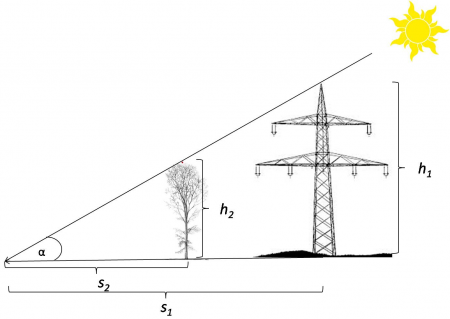Exercise : Measuring heights of trees outside the forest (TOF) in digital orthophotos (DOP)
(→Measuring shadow length) |
(→Shadows in orthorectified remote sensing images) |
||
| Line 2: | Line 2: | ||
[[Image:shadow_length.png|450px|thumb|right|'''Figure A''': Shadow length ''s'' and object height ''h'']] | [[Image:shadow_length.png|450px|thumb|right|'''Figure A''': Shadow length ''s'' and object height ''h'']] | ||
| − | A simple application of the intercept theorem in elementary geometry is to determine the height of a tree by measuring the shadow length. According to Fig. '''A''' the shadow length <math>s_1</math> and the height <math>h_1</math> of a man-made object such as an overhead line tower were measured on the ground. If the lenght of a tree's shadow <math>h_2</math> is determined at the same time of the day we are able to compute <math>h_2=s_2*\frac{h_1}{s_1}</math> | + | A simple application of the intercept theorem in elementary geometry is to determine the height of a tree by measuring the shadow length. According to Fig. '''A''' the shadow length <math>s_1</math> and the height <math>h_1</math> of a man-made object such as an overhead line tower were measured on the ground. If the lenght of a tree's shadow <math>h_2</math> is determined at the same time of the day we are able to compute <math>h_2=s_2*\frac{h_1}{s_1}</math>. |
| − | We may also use trigonometry if we know the sun elevation <math>\alpha</math>. The height of a tree is then computed <math>h_2=s_2*\tan \alpha</math> | + | We may also use trigonometry if we know the sun elevation <math>\alpha</math>. The height of a tree is then computed <math>h_2=s_2*\tan \alpha</math>. |
==Measuring shadow length and sun azimut in digital orthophotos== | ==Measuring shadow length and sun azimut in digital orthophotos== | ||
Revision as of 15:07, 15 July 2014
Contents |
Shadows in orthorectified remote sensing images
A simple application of the intercept theorem in elementary geometry is to determine the height of a tree by measuring the shadow length. According to Fig. A the shadow length \(s_1\) and the height \(h_1\) of a man-made object such as an overhead line tower were measured on the ground. If the lenght of a tree's shadow \(h_2\) is determined at the same time of the day we are able to compute \(h_2=s_2*\frac{h_1}{s_1}\).
We may also use trigonometry if we know the sun elevation \(\alpha\). The height of a tree is then computed \(h_2=s_2*\tan \alpha\).
Measuring shadow length and sun azimut in digital orthophotos
Load and display German Geoadata using QGIS 2.4 following the Exercise: Displaying German Geobasis data (GBD) or load the saved project file .\GBData\display_gbd.qgs where the project coordinate reference system (CRS) is set to ETRS89/UTM32N (EPSG:25832).
- Create a new shapefile layer
- Select Layer --> New --> New Shapefile Layer.
- As layer type, select Line. Click the Specify CRS button and select ETRS89/UTM32N (EPSG:25832).
- To add an attibute:
- For the attribute's name type Class into the Name field of the New attribute section.
- Select Whole number as data type.
- Confirm with Add to attributes list.
- Confirm with OK and enter path and name (e.g. measure_shadow_length.shp) in the following menu.
- Select Layer --> New --> New Shapefile Layer.
